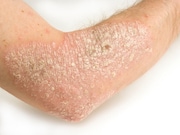Findings show alignment of patient-reported symptoms, clinician assessment tools
THURSDAY, May 2, 2019 (HealthDay News) — Patient-reported symptoms of psoriasis, quality of life, and work productivity worsen with increasing disease severity, as measured by two established clinician assessment tools, according to a study published online April 20 in BMJ Open.
Bruce Strober, M.D., Ph.D., from the University of Connecticut Health Center in Farmington, and colleagues examined the association between psoriasis severity, assessed by body surface area (BSA) and the Investigator’s Global Assessment (IGA), and patient-reported outcomes among 1,529 adult patients with psoriasis in the Corrona Psoriasis Registry. Patients were being treated with biological or nonbiological systemic psoriasis medications in a real-world setting. Previously, the IGA has only been used in clinical trials.
The researchers found that with more severe psoriasis, symptoms worsened, Dermatology Life Quality Index scores increased (P < 0.05 for each level of BSA and IGA), EuroQoL Visual Analogue Scale scores decreased (P < 0.05 for each level of BSA and IGA), and Work Productivity and Activity Impairment (WPAI) scores increased consistently. Moderate to very severe psoriasis using BSA score was associated with poorer outcomes for the "impairment while working" and "daily activities impaired" WPAI domains (all P < 0.05 versus mild psoriasis). An association was noted between very severe psoriasis and increased "work hours missed" and "work hours affected" (both P < 0.05 versus mild psoriasis). Using IGA, findings were similar.
“Increased psoriasis severity as measured by both BSA and IGA categories was associated with worsened patient-reported outcomes in this USA-based psoriasis registry study,” the authors write.
Several authors disclosed financial ties to pharmaceutical companies, including Corrona and Novartis, which funded the study.
Copyright © 2019 HealthDay. All rights reserved.








